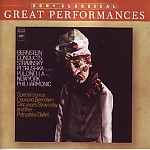As time goes on, Leonard Bernstein’s New York recording of Petrushka only gains in stature. There are two ways to perform this music: as a brilliant but somewhat abstract orchestral showpiece, and as a vivid theatrical experience. The former predominates today, but as his typically enjoyable lecture-demonstration included with the recording makes clear, Bernstein opts for the latter, and projects it as few have. And so the fair music explodes with earthy vitality, Petrushka himself comes across as touchingly pathetic, the Moor as truly angry and nasty, and the conclusion genuinely spooky. All of this is contained within an interpretation that catches the score’s rhythmic punch as few have before or since, thanks to the virtuoso response of the New York Philharmonic. Really, if you are going to do the work complete, then this is the way to go. Even the ending, so often an anticlimax, works in this context.
The performance of Pulcinella has a certain curious, period charm. These days we’re used to hearing virtuoso chamber orchestras treat the piece increasingly like the Baroque music that it updates. I certainly don’t disdain the “improvements” (if such they are) brought on by the period-performance movement, and there are versions of the ballet that feature a more razor-sharp rhythmic response. But on the other hand, isn’t Bernstein’s comparatively romantic approach more what Stravinsky himself would have expected to hear? And doesn’t it only heighten the Baroque/Modern antithesis that makes listening such a fascinating experience in the first place? You be the judge. It’s a very enjoyable rendition by any standard, and both here and in Petrushka the remastered sound has come up very well. It’s good to be reminded of how much sheer fun all of this music really is, and how much warmth of feeling it contains.
































